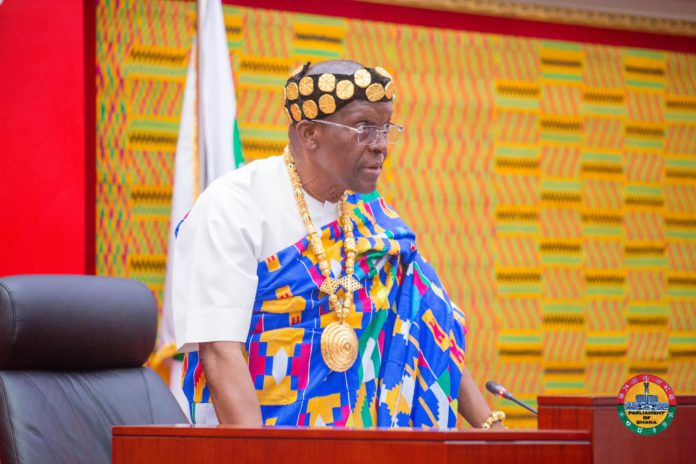Ghana’s judiciary may appear politicised, which is unfortunate, but that’s no basis for disrespecting a court’s decision, however, offensive and unjust it might seem.
The Supreme Court stayed the ruling of the Speaker of Parliament, Alban Sumaina Bagbin, on Oct. 17, 2024, in which he declared four seats in the legislature vacant.
The Speaker’s pronouncement affected three seats the governing New Patriotic Party (NPP) currently occupies and one seat the opposition National Democratic Congress (NDC) occupies.
The affected Members of Parliament (MPs) were Cynthia Mamle Morrison (NPP MP for Agona West, now independent candidate), Oboafo Kwadjo Asante (NPP MP for Suhum, now independent candidate), Peter Kwakye Ackah (NDC MP for Amenfi Central, now independent candidate), and Andrew Asiamah (independent MP, now NPP candidate for Fomena).
Mr Bagbin’s decision was anchored on his interpretation of Clause 1 (g) and (h) of Article 97 of the Constitution, 1992, which provide that:
“97. (1) A member of Parliament shall vacate his seat in Parliament –
(g) if he leaves the party of which he was a member at the time of his election to Parliament to join another party or seeks to remain in Parliament as an independent member; or
(h) if he was elected as a member of Parliament as an independent candidate and joins a political party.
The Speaker of Ghana’s 7th Parliament, Professor Aaron Mike Oquaye, made a similar pronouncement in 2020, declaring the Fomena seat vacant after the NPP occupant, Andrew Amoako Asiamah, decided to contest the election as an independent candidate.
Mr Bagbin’s Oct. 17, 2024, pronouncement leaves the ruling NPP and opposition NDC with 135 and 136 MPs, respectively, giving a thin majority to the largest opposition party.
It is important to note that both the NDC and NPP looked on in 2020 when Speaker Professor Oquaye declared the Fomena seat vacant, in his strain interpretation of the provisions of Clause 1 (g) and (h) of Article 97 of the Constitution, 1992.
Seeing these two political parties at a cross over Mr. Bagbin’s ruling, less than four years after Professor Oquaye’s should tell you that political consideration always precedes the national interest in any action these politicians take.
While the Speaker of Ghana’s 8th Parliament’s decision has received around-the-clock criticisms, the Supreme Court’s rapid response, staying Mr Bagbin’s ruling, has courted the displeasure of NDC supporters, including opposition lawmakers.
I have read on social media posts encouraging Mr Bagbin to disrespect the Supreme Court’s decision on his ruling. Others have said the tenor of the apex court’s decision and the timing calls for positive defiance of the court’s Oct. 18, 2024, ruling.
Heeding this call will be the chief sin of the Fourth Republic, and the Speaker must act cautiously.
Mr Bagbin has to respect the Supreme Court’s decision to stay his ruling, declaring the four Parliamentary seats vacant. We can debate the legality or propriety of the decision, but that is no grounds for disrespecting a court’s decision.
Suppose the apex court’s decision offends the Speaker or the opposition lawmakers in any way. In that case, their remedies do not lie in positive defiance, as some suggest, but rather in challenging that decision at the appropriate forum.
Disrespecting the Supreme Court’s decision at this crucial time will be the low point of his stellar political career, and I think Mr Bagbin must be careful about his next move.
How he responds to the SC’s ruling on Tuesday, Oct. 22, 2024, on the floor of Parliament will determine whether posterity would be kind to Mr Bagbin or vilify him.
I will encourage him to etch his place on the good side of Ghana’s history. There is no glory in being a political villain, however short or long-term that might be.
No judge anywhere is immune from errors or mistakes, which is why some judges’ decisions are impeached, reviewed, or set aside on appeal. While we are open to disagreeing with the Supreme Court’s less-than-24-hour ruling on the matter, rightly so, we should not disrespect the court in any manner.
Ghana’s judiciary, however politically tainted, stands as the only bastion of hope for our faltering democracy. Trust in the Executive and Legislature is already at an all-time low, and we must hesitate to add the Judiciary to these failed political institutions.
We must work to protect the sanctity of our courts, and this requires us to continue to have faith in the Judiciary’s ability to protect citizens against the aggressive use of State power.
There will be challenges, as is evident in even advanced democracies, but we need to put in the work.
*******
The author, Austin Kwabena Brakopowers, is a private legal practitioner, journalist, development communication practitioner, and fact-checking consultant who has written extensively on information disorder, law, quality journalism, development communication, and international politics. You can reach him at Brakomen@outlook.com

